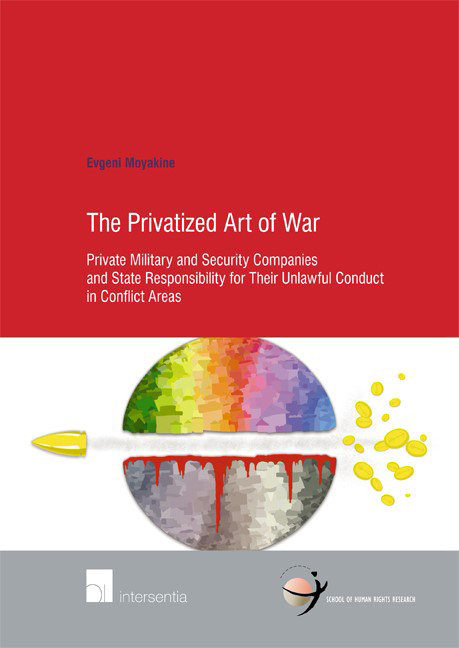 The Privatized Art of War
The Privatized Art of War Book contents
- Frontmatter
- Dedication
- Acknowledgments
- Contents
- List of Abbreviations
- Chapter I General Introduction
- Chapter II Privatization of War and Security – War is Business and Vice Versa
- Chapter III Existing Legal Framework of PMSC Operation
- Chapter IV Legal Status of PMSC Employees
- Chapter V State Responsibility under the Draft Articles on State Responsibility
- Chapter VI State Responsibility for Non-Compliance with Positive International Law Obligations
- Chapter VII Summary, Overall Conclusions, and Final Observations
- Dutch Summary — Nederlandse Samenvatting
- Russian Summary — KPATKOE COДEPЖAHИE KHИГИ HA PУCCKOM ЯэЬІKE
- Selected Bibliography
- Table of Cases
- Selected United Nations Documents
- Index
- Curriculum Vitae
- School of Human Rights Research Series
Chapter I - General Introduction
Published online by Cambridge University Press: 28 November 2017
- Frontmatter
- Dedication
- Acknowledgments
- Contents
- List of Abbreviations
- Chapter I General Introduction
- Chapter II Privatization of War and Security – War is Business and Vice Versa
- Chapter III Existing Legal Framework of PMSC Operation
- Chapter IV Legal Status of PMSC Employees
- Chapter V State Responsibility under the Draft Articles on State Responsibility
- Chapter VI State Responsibility for Non-Compliance with Positive International Law Obligations
- Chapter VII Summary, Overall Conclusions, and Final Observations
- Dutch Summary — Nederlandse Samenvatting
- Russian Summary — KPATKOE COДEPЖAHИE KHИГИ HA PУCCKOM ЯэЬІKE
- Selected Bibliography
- Table of Cases
- Selected United Nations Documents
- Index
- Curriculum Vitae
- School of Human Rights Research Series
Summary
States must recognize the possibility that, in certain circumstances, they have State Responsibility for the acts of otherwise private groups, such as PMFs, under international law.
Oliver R. JonesINTRODUCTION
The 1990s set in motion the era of “corporate globalization”, while the end of the Cold War that took place with the fall of the Soviet Union in 1991 led to the emergence of so-called private military and security companies (hereinafter: PMSCs). Currently, these PMSCs are actively hired by a wide spectrum of clients ranging from States to international organizations and multinational corporations and this reliance on private military and security contractors has increased dramatically over the last two decades. They play an undeniably significant global role and are contracted to provide various military and security services in horrific times of war and blessed times of peace. Performing these essential tasks as professionally as possible, private contractors strive to gain more financial profit and compete with other PMSCs on the expanding market of military and security expertise. Many questions with regard to the functioning of these firms and its consequences, however, remain largely unanswered. Who is responsible for the misconduct of PMSCs and their employees in case of human rights violations and breaches of the law of armed conflict and what is the extent of this responsibility? Can States be held responsible for the illegal activities of PMSCs and their personnel and, if they can, under what circumstances? Which States should face international responsibility in this regard and what is the legal basis for this responsibility?
Some might be inclined to argue that international law primarily focuses on the conduct of States and State actors and does not extensively deal with non-State actors, such as PMSCs active in many conflict areas. There is, for instance, no elaborate legal framework governing international responsibility of non-State actors and thus there is a certain deficit of responsibility of private actors operating on the international plane. Therefore, it is frequently asserted that PMSCs operate in “a legal vacuum”, “the grey area of law”, “beyond the law”, and even “in the shadows”.
- Type
- Chapter
- Information
- The Privatized Art of WarPrivate Military and Security Companies and State Responsibility for Their Unlawful Conduct in Conflict Areas, pp. 1 - 44Publisher: IntersentiaPrint publication year: 2015


